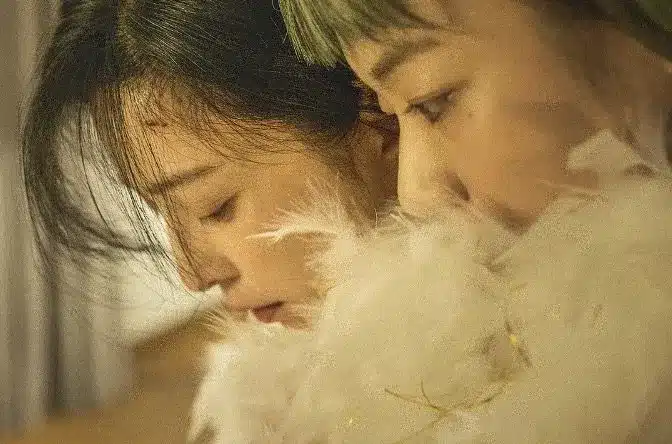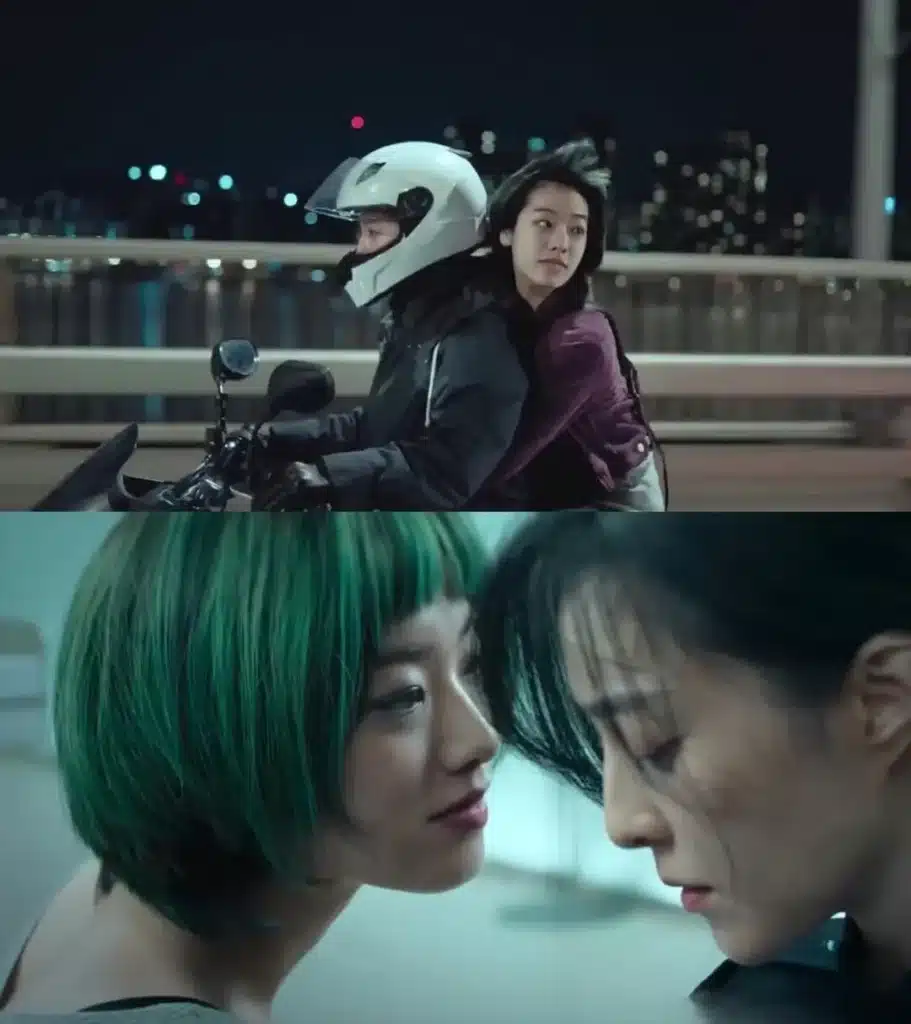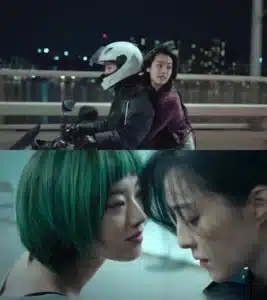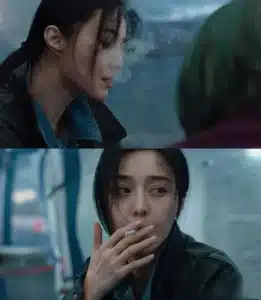Recently I came into “Green Night,” a fascinating Korean-Chinese co-production that questions traditional narrative while examining the outskirts of society. As a passionate cinephile always looking for unique voices in global film.

Set against Seoul’s neon-lit underworld, this film has Chinese actress Fan Bingbing teamed with up-and-coming talent Lee Zhouying in a narrative of unusual connection and desperate rebellion that cuts across language barriers.
Director Han Shuai’s second feature presents a visually striking meditation on female agency, immigrant experience, and the possibility of escape from social constraints, premiering at the 73rd Berlin International Film Festival where it attracted nominations for both the Teddy Award and Panorama Audience Award.
Plot
The story revolves on Jingxia, a Chinese immigrant working at an airport security check post in Seoul. Her boring life unexpectedly changes when she meets a green-haired rebel girl who boldly represents gay roles in Korean film.

Jingxia is driven into a path of self-discovery and revolt by this coincidental rencontre. Together, the two ladies negotiate the demands of their repressive marriages and enter the dangerous territory of Korean ganglands. As they create a strong bond while on the run, their narrative turns from one of survival and rebellion.
Inspired by the venerable 1991 road film “Thelma & Louise,” “Green Night” presents a contemporary spin on female criminality and resistance. The women flee, their friendship growing as they negotiate ever more difficult circumstances together.
Charactor

Chinese immigrant Jingxia works at an airport security gate in Seoul. She lives a monotonous life in an oppressive marriage until a chance meeting alters everything. Her character changes remarkably from a rule- follower to someone ready to risk all for freedom and connection.
Well-known Chinese actress Fan Bingbing, who formerly starred as the mutant Blink in X-Men 3, plays the part. Fan vanished from public view for a spell under alleged tax investigation, hence this role is a major comeback to the front stage.

The enigmatic green hair woman stands for freedom and revolt. Unlike Jingxia’s first compliance, she drags her into her world and lives by her own guidelines. For Jingxia’s metamorphosis, her character both acts as friend and trigger.
Joo-young Lee is a Korean actor who plays the character, giving this Korean same-sex love complexity and passion.
Director

Han Shuai
Graduating from the Central Academy of Drama, Han Shuai worked as director and screenwriter. With Summer in Han River his feature film debut, his earlier works include short films 1999, Tony and Mingming, and The Last Shot. Additionally he wrote New Sensation Cinema — The Aesthetic Style and Formal Characteristics of Lou Ye's Works.
CAST HIGHLIGHT
The lead actress (Fan Bingbing) is best known for starring in the 2016 film I Am Not Madame Bovary and her role in the international production X-Men: Days of Future Past (2014) as Blink.
The actress who portrays Jingxia (Fan Bingbing) has appeared in the Lost in Beijing (2007) and Buddha Mountain (2010), winning major international awards for both performances.
Fan Bingbing served as jury member at the 70th Cannes Film Festival (2017) and was featured on the cover of Time Magazine’s Asia edition the same year.
Lee Zhouying, who plays the green-haired girl, is an emerging Taiwanese actress. Green Night represents her breakthrough role in international cinema.
The director (Han Shuai) is known for his visually distinctive approach to storytelling, drawing influence from acclaimed Chinese filmmakers Lou Ye and Li Yu.
Green Night Review
Review




“Green Night” is a contradictory movie. Although its goal in tackling difficult subjects is commendable, its implementation does not always reflect that. Though it aims to address several social concerns—from immigration challenges and male dominance to LGBTQ+ relationships—often it settles for surface-level investigation rather than delving further.
Story ★★★☆☆ (3/5)
Promising is the narrative framework, which presents two women from many backgrounds joined by their marginalised situation and quest of freedom. But the movie’s attempt to cover too many subjects at once lessens its impact. Many of the introduced but not fully developed plot threads leave viewers with philosophical concepts instead of emotionally relevant stories. Though they function more as plot devices than natural story components, the criminal aspects involving drug trafficking seem especially undeveloped.
Chemistry ★★★½☆ (3.5/5)
The emotional centre of the movie is formed from Jingxia’s relationship with the green-haired girl. Their relationship grows from wary curiosity to intimate alliance by means of well crafted visual parallels and meaningful encounters. Using cross-cultural language difficulties and shared tragedy to create their friendship, the film spends a lot of time documenting this change. These events nonetheless paint a striking picture of unanticipated connection even if one feels sometimes deliberate.
Acting ★★★★☆ (4/5)
With long close-ups that demand sophisticated emotional expression with no conversation, Fan Bingbing presents the best performance of the movie Her subtle and powerful depiction of Jingxia’s inner struggle between social restrictions and personal freedom Though occasionally using more stylised Korean acting approaches, her co-star Lee Zhouying gives her role young vitality and rebellious nature. Through their chemistry and dedicated performances, both actors help to surpass the restrictions of the script.
Production ★★★½☆ (3.5/5)
Using handheld following shots and symbolic colour schemes, Director Han Shuai’s visual approach clearly borrows from directors like Lou Ye and Li Yu. The constant green hue clearly contrasts with religious crimson symbols to graphically show the struggle between social restriction and revolt. These methods, nevertheless, may seem more like imitation than originality. The best photography in the movie is found in private moments between the protagonists where the camera’s proximity increases emotional intensity.
Ending ★★★☆☆ (3/5)
The last scene of the movie tries to strike a balance between the prospect of personal freedom and the reality of social restrictions. The finale seems more predestined by the film’s thematic themes rather than developing naturally from character growth, even though avoiding both exaggerated triumph and simple sorrow.
Especially for its LGBTQ+ aspects in Korean film, “Green Night” sparked a lot of conversation at the Berlin Film Festival. The film’s Crystal Bear Award candidacy emphasises how, despite its shortcomings, it influences the global landscape.
Given China’s increasingly closed-off entertainment sector and dwindling output of Chinese LGBTQ+ films, Fan Bingbing’s choice to take this part has extra relevance. Though the movie itself doesn’t completely capitalise on its potential to make a more significant message, her involvement is a significant contribution to Asian representation.
“Green Night” finally shows as a visually arresting but narratively uneven examination of female connection and rebellion—a movie with great aspirations that falls short in terms of emotional depth its subjects merit.
Green Night Information
Awards
73rd Berlin International Film Festival
- Teddy Award for Best Feature Film (Nominated)
- Panorama Audience Award for Best Feature Film (Nominated)
